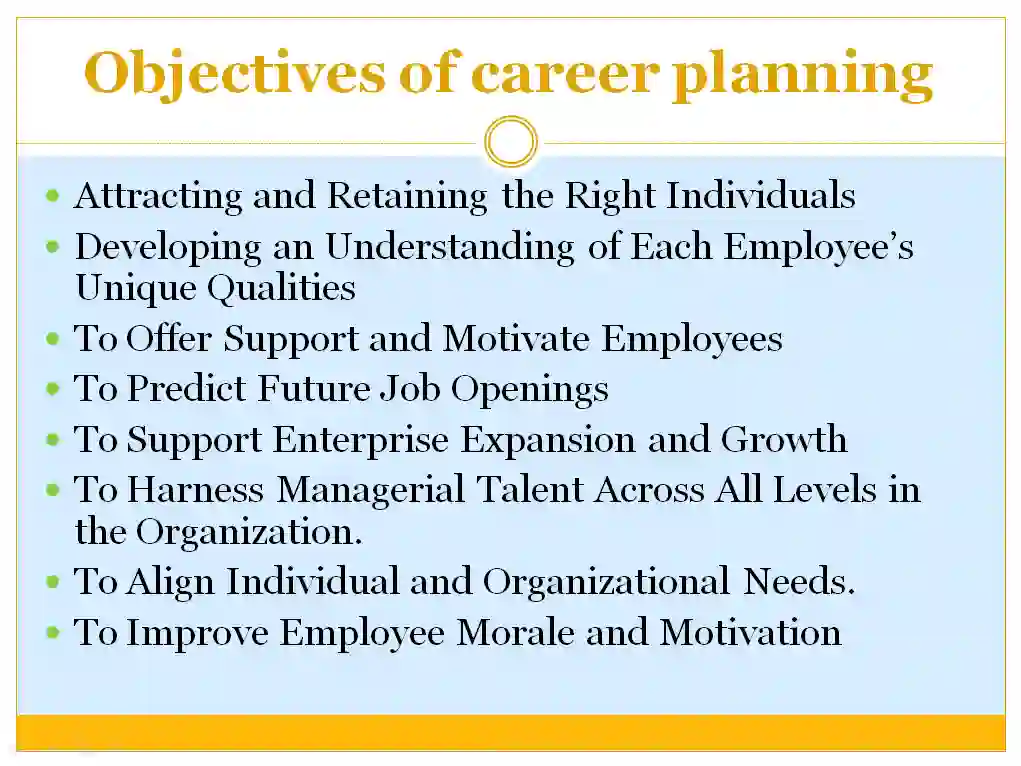Table of Contents:
-
- What is Career Planning in HRM?
- Objectives of Career Planning in hrm
- Meaning of Career Planning in hrm
- Definition of Career Planning in hrm
- Features of Career Planning in hrm
- Need for Career Planning in hrm
What is Career Planning in HRM?
Career planning in HRM is a systematic process which is useful for both the employees and the employers of the organisation. Employers use this process to identify, recruit and sustain individuals with full potential for a longer time within the organisation. This process ensures that employees are given roles where they can learn and use their skills to the maximum value.
Career planning in HRM increases the profitability, efficiency and productivity of the organisation. A well-designed career planning program ensures that employees have all the necessary skills needed to perform the job. It creates self-awareness and loyalty towards the organisation among employees by enabling them to identify their strengths, weaknesses, values, skills and knowledge.
Objectives of Career Planning in Hrm
Career planning is necessary to guide individuals in making informed decisions about their professional pathways. Having clear objectives in career planning can help individuals to effectively navigate the ever-evolving job market and achieve success in their lives.
Objectives of career planning are as follows:
-
- Attracting and Retaining the Right Individuals
- Developing an understanding of the unique qualities of employees
- To Offer Support and Motivate Employees
- To Predict Future Job Openings
- To Support Enterprise Expansion and Growth
- To Harness Managerial Talent Across All Levels in the Organization.
- To Align Individual and Organizational Needs.
- To Improve Employee Morale and Motivation
The following points describe the major objectives of career planning:
1) Attracting and Retaining the Right Individuals
The primary objective of career planning is to retain hard-working and talented employees. The workforce becomes more stable due to low employee turnover. The fact that the organization provides opportunities for promotion and career progress increases employees’ loyalty. This helps to reduce the cost of staffing new employees. Moreover, a unique corporate culture can develop and thrive, when individuals advance within the organization.
2) Developing an understanding of the unique qualities of employees
Career planning helps define employees’ career paths, considering their capabilities and their eagerness to receive training and growth opportunities for more senior positions.
3) To Offer Support and Motivate Employees
Career planning provides guidance and encouragement to employees who need to fulfil their potential. It also identifies personal interests, strengths, abilities, and weaknesses and how they relate to careers.
4) To Predict Future Job Openings
Career planning anticipates the future vacancies that may arise due to retirement, resignation, death, etc., at the managerial level. Therefore, it provides fairly reliable guidance for manpower forecasting. A forward career plan helps to avoid misfits/mismatches in managerial positions.
5)To Support Enterprise Expansion and Growth
Career planning promotes the growth and development of the organization. The process allows them to identify and cultivate the essential employees for job vacancies promptly. Organizations by implementing systematic career planning can effectively introduce job enlargement strategies. Effective career planning can help them meet future needs that may arise from job design and technological changes. It also helps to achieve organisational development and higher productivity.
6) To Harness Managerial Talent Across All Levels in the Organization.
Career planning ensures improved utilization of human resources by fostering employee satisfaction and productivity. It also ensures that promising persons gain experiences that equip them to handle responsibility that matches their capability and potential.
7) To Align Individual and Organizational Needs.
The basic aim of career planning is the integration of individual and organisational needs. Career planning plays a key role in recognizing employees’ positive attributes that fuel organizational growth. It assists in understanding the connection between personality and occupational or professional objectives, and in aligning them with the organization’s mission and goals.
8) To Improve Employee Morale and Motivation
Career planning improves employee morale and motivation by matching skills to job requirements and providing promotion opportunities.

Related Articles:
Meaning of Career Planning in Hrm
A career is the continuous sequence of an individual work experience as they evolve. It comprises a series of work-related activities, that bring continuity, order, and purpose to a person’s life. This provides an objective view of someone’s career. Additionally, there is a subjective aspect to the concept of a career. A career consists of the changes in values, attitudes and motivations that occur as a person grows older.
Career planning is the systematic process by which a person selects his career goals and the path to these goals. From the organisation’s viewpoint, it means helping the employees plan their careers in terms of their capabilities within the context of the organisation’s needs. It involves designing an organisational system that outlines career movement and growth opportunities for employees from their initial employment to retirement. Those who can fill future positions are readied and identified to assume these roles. It is a managerial technique for planning the entire career progression of young employees. It requires development, discovery, planned employment and re-employment of talents.
Definition of Career Planning in Hrm
According to McMahon and Merman, “Career planning is a deliberate process of becoming aware of self, opportunities, constraints, choices, and consequences, it’s satisfying career-related goals, and programming work, education, and related development experiences to provide the direction, timing and sequence of steps to attain a specific career goal”.
According to Schermerhorn, “Career planning is a process of systematic matching career goals and individual capabilities with opportunities for their fulfilment”.
Features of Career Planning in Hrm
Features of career planning are as follows:
1) Participative Process: Career planning involves a participatory approach, where job assignments are solely based on merit. This approach enhances employee morale and boosts their productivity.
2) Involves Survey of Employee’s Abilities and Attitudes: Career planning involves a survey of employee’s abilities and attitudes. It becomes possible, therefore, to group people talking on a similar wavelength and place them under supervisors who are responsive to that wavelength. This results in more cohesive or homogenous work teams. The organization can identify employees suitable for promotion from within the event.
3) Developmental Process: Career planning serves as a foundational method for developing and utilizing the potential of your workforce. It serves as a strategic tool for effectively managing people to achieve desired outcomes, rather than being a standalone objective.
4) Continuous Process: It’s important to understand that career planning is a continuous journey, not a one-time occurrence.
5) Life-Long Learning Process: Career planning is a life-long learning process which involves personal development, the ability to make informed career decisions, self-manage and ultimately ensure your employability.
Need for Career Planning in Hrm
Below are the reasons that underline the need for career planning:
1) Selection of Career Goals: A career encompasses all the positions an individual holds throughout their working life. Employees need to predetermine desired future positions they strive to reach as a path of career. Career planning is important for setting career goals.
2) Selection of Career Path: Employees need to select a career path to achieve career goals. Career path denotes a sequential pattern of jobs during an employee’s career. Career planning is necessary to determine the right career path.
3) Motivating Employees for Career Development: Career planning forces employees to set career goals and work to achieve them. It is needed to motivate employees for career development through further training, education and other developmental activities.
4) Meeting Internal Staffing Needs: Career planning is needed to meet the internal staffing needs of the organisation. This provides the organisation with a larger pool of qualified applicants. To implement a human resource plan effectively, career planning is necessary.
5) Reducing Employee Turnover: Best employees have the most significant career mobility. Effective career planning is needed to retain such employees in the organisation by reducing their turnover.
6) Satisfying Employee Needs: Career planning is needed to satisfy the higher-level needs of employees such as esteem and self-development needs leading to promotion, responsibility, achievement, etc.
7) Identifying Training and Development Needs: Career planning is needed to identify the training and development needs of employees. It is also required for career development.
8) Increasing Creativity: Career planning is required to increase employees’ creativity. It is needed for innovation in the organisation. It can lead to entrepreneurship within the organisation.
Importance of Career Planning
Career planning is important for both employees and organisations:
1) Employees
Career planning is important to employees due to the following reasons:
i) Increased Productivity: Positive work content of the chosen career is a major source of increased productivity because work content is an intrinsic factor, and an intrinsic factor is valued more by people than an extrinsic factor. On accomplishing the work people develop a feeling that they have achieved something meaningful for themselves, the organisation, and society.
When individuals have clear career path goals they feel motivated towards work, which enhances their capacity for self-improvement and ultimately increases productivity. Through proper career planning, an individual can align their work with their interest and values.
ii) Explicit Career Path: Career planning helps an employee to understand the multiple available career opportunities present in an organisation. A person comes to know in advance the level to which he can rise and the potential and aptitude he has.
iii) Focused Self-Development: Clear goals towards career paths can make employees put full efforts towards self-improvement through a variety of methods. This self-development, based on a clearly defined career path can make individuals achieve greater success.
2) Organisation
Career planning is important to the organisation due to the following reasons:
i) Attracting and Retaining Talent: Talented people are always scarce in the competitive business environment. Organisations can attract and retain skilled people only when they are given a culture that values career development and offers a bright future for them. Effective career planning provides clear career paths, training opportunities, and mentorship programs to employees that create a sense of loyalty and trust towards the organisation.
ii) Assured Availability of Talent: For growing managers internally, there must be a well – worked out career path for every manager and every manager is developed to proceed effectively on this career path.
iii) Protecting Interests of Special Groups of Employees: There is a social necessity to bring social groups which are in a disadvantageous position like women, weaker sections of society, physically handicapped, ex-servicemen, and so on at par with others. From the organisational side, this can start with human resource planning followed by career planning and development.
iv) Promoting Organisational Image: Strategic career planning attempts to align employees’ skills with job responsibilities by making them feel valued. Employees are the best source that represents the culture and values of an organisation which overall contributes to a strong brand image in the marketplace.
